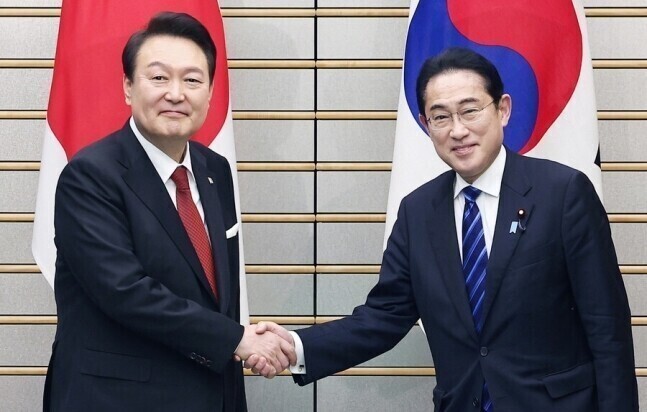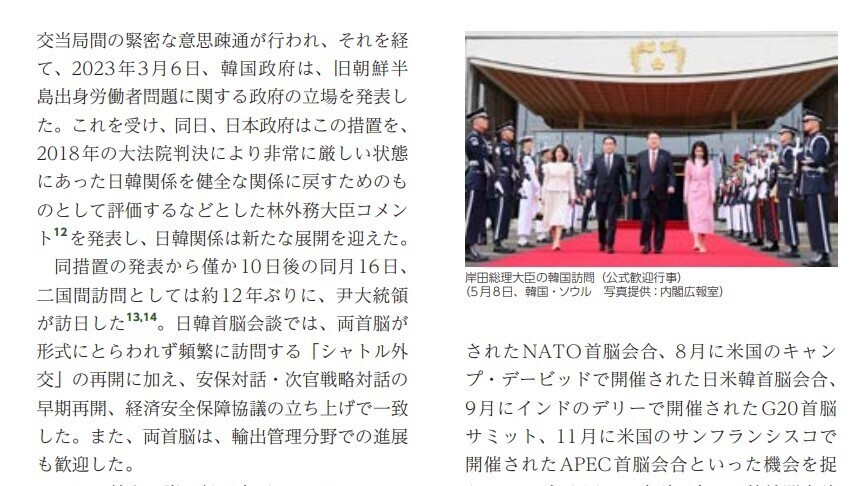hankyoreh
Links to other country sites 다른 나라 사이트 링크
Japan officially says compensation of Korean forced laborers isn’t its responsibility

In its annual diplomatic bluebook, Japan flatly declared that the Korean government is responsible for handling multiple judgments by the Korean Supreme Court that order Japanese companies to pay damages to Korean victims of forced labor. The report did not contain a single word of apology or remorse by the Japanese government and instead reiterated Japan’s far-fetched territorial claim to the island of Dokdo.
Japanese Foreign Minister Yoko Kamikawa briefed the Japanese cabinet on the 2024 Diplomatic Bluebook in a meeting Tuesday. Each year, Japan’s Ministry of Foreign Affairs publishes a diplomatic bluebook describing recent international affairs and Japan’s diplomatic activities.
This year’s bluebook contains a new section about the issue of victims of forced labor, which has emerged as a focal point of conflict between Korea and Japan. While explaining that the Korean Supreme Court had made several rulings first in 2018 and then in December 2023 and January 2024 ordering Japanese companies to pay damages, the bluebook noted that the Japanese government “deeply regrets and cannot accept” those rulings.
The bluebook also noted that the Yoon administration had announced in March 2023 that if the Korean plaintiffs won their forced labor lawsuits, a Korean foundation would pay their awards and the delayed interest.
In effect, Japan has now clearly stated in an official document that despite recent judgments by the Korean Supreme Court, the matter of compensation for forced labor is out of Japan’s hands because of the Yoon administration’s concessions.
The Yoon administration has been pushing ahead with a third-party repayment plan announced on March 6, 2023, under which the plaintiffs would be compensated not by the Japanese companies but by the Foundation for Victims of Forced Mobilization by Imperial Japan, which is affiliated with the South Korean government.
The diplomatic bluebook did not contain any expressions of apology or remorse in regard to Japan’s past actions. While mentioning Prime Minister Fumio Kishida’s decision to uphold past government statements following the Yoon administration’s concessions, the bluebook only stated that “the Japanese government upholds all of the positions of previous cabinets in regard to our historical position, including the Japan–South Korea Joint Declaration announced in October 1998.”
That was the joint declaration in which Korean President Kim Dae-jung and then Japanese Prime Minister Keizo Obuchi announced a partnership between the two countries.

The bluebook omitted any direct reference to the apology and remorse contained in the Japan–South Korea Joint Declaration and the Murayama Statement (1995). That ambiguity parallels the backward attitude apparent in Kishida’s failure to mention Japan’s wars of aggression and colonial rule, let alone to apologize or express contrition for them, in his address to a joint session of the US Congress on Thursday, while he was on a state visit to the US.
Japan continues to make unreasonable claims about Dokdo.
“Takeshima [Japan's name for Dokdo] is indisputably an inherent part of the territory of Japan in light of historical facts and based on international law. Korea continues its illegal occupation of Takeshima, which has no basis in international law, by stationing a security force there,” the diplomatic bluebook said.
The phrase about Korea’s “illegal occupation” of Dokdo first appeared in the 2018 diplomatic bluebook and has appeared in every subsequent edition over the past seven years.
The bluebook also contained more positive language about Korea-Japan relations, describing Korea as “an important neighbor and cooperative partner for responding to various challenges in the international community.” That’s the first time Japan’s diplomatic bluebook has described Korea as a “partner” since the 2010 edition, 14 years ago.
A separate section was also added for Korea, the US and Japan. “Trilateral cooperation goes beyond responding to North Korea and is essential for peace and stability in the region. We are also exploring cooperation with the aim of achieving a free and open Indo-Pacific,” the bluebook said.
By Kim So-youn, Tokyo correspondent
Please direct questions or comments to [english@hani.co.kr]

Editorial・opinion
![[Guest essay] Maybe Korea’s rapid population decline is an opportunity, not a crisis [Guest essay] Maybe Korea’s rapid population decline is an opportunity, not a crisis](https://flexible.img.hani.co.kr/flexible/normal/500/300/imgdb/original/2024/0430/9417144634983596.jpg) [Guest essay] Maybe Korea’s rapid population decline is an opportunity, not a crisis
[Guest essay] Maybe Korea’s rapid population decline is an opportunity, not a crisis![[Column] Can Yoon steer diplomacy with Russia, China back on track? [Column] Can Yoon steer diplomacy with Russia, China back on track?](https://flexible.img.hani.co.kr/flexible/normal/500/300/imgdb/original/2024/0430/1617144616798244.jpg) [Column] Can Yoon steer diplomacy with Russia, China back on track?
[Column] Can Yoon steer diplomacy with Russia, China back on track?- [Column] Season 2 of special prosecutor probe may be coming to Korea soon
- [Column] Park Geun-hye déjà vu in Yoon Suk-yeol
- [Editorial] New weight of N. Korea’s nuclear threats makes dialogue all the more urgent
- [Guest essay] The real reason Korea’s new right wants to dub Rhee a founding father
- [Column] ‘Choson’: Is it time we start referring to N. Korea in its own terms?
- [Editorial] Japan’s rewriting of history with Korea has gone too far
- [Column] The president’s questionable capacity for dialogue
- [Column] Are chaebol firms just pizza pies for families to divvy up as they please?
Most viewed articles
- 1‘We must say no’: Seoul defense chief on Korean, USFK involvement in hypothetical Taiwan crisis
- 2After election rout, Yoon’s left with 3 choices for dealing with the opposition
- 3Why Kim Jong-un is scrapping the term ‘Day of the Sun’ and toning down fanfare for predecessors
- 4First meeting between Yoon, Lee in 2 years ends without compromise or agreement
- 5Two factors that’ll decide if Korea’s economy keeps on its upward trend
- 6Noting shared ‘values,’ Korea hints at passport-free travel with Japan
- 7Under conservative chief, Korea’s TRC brands teenage wartime massacre victims as traitors
- 8AI is catching up with humans at a ‘shocking’ rate
- 9Months and months of overdue wages are pushing migrant workers in Korea into debt
- 10[Guest essay] Maybe Korea’s rapid population decline is an opportunity, not a crisis